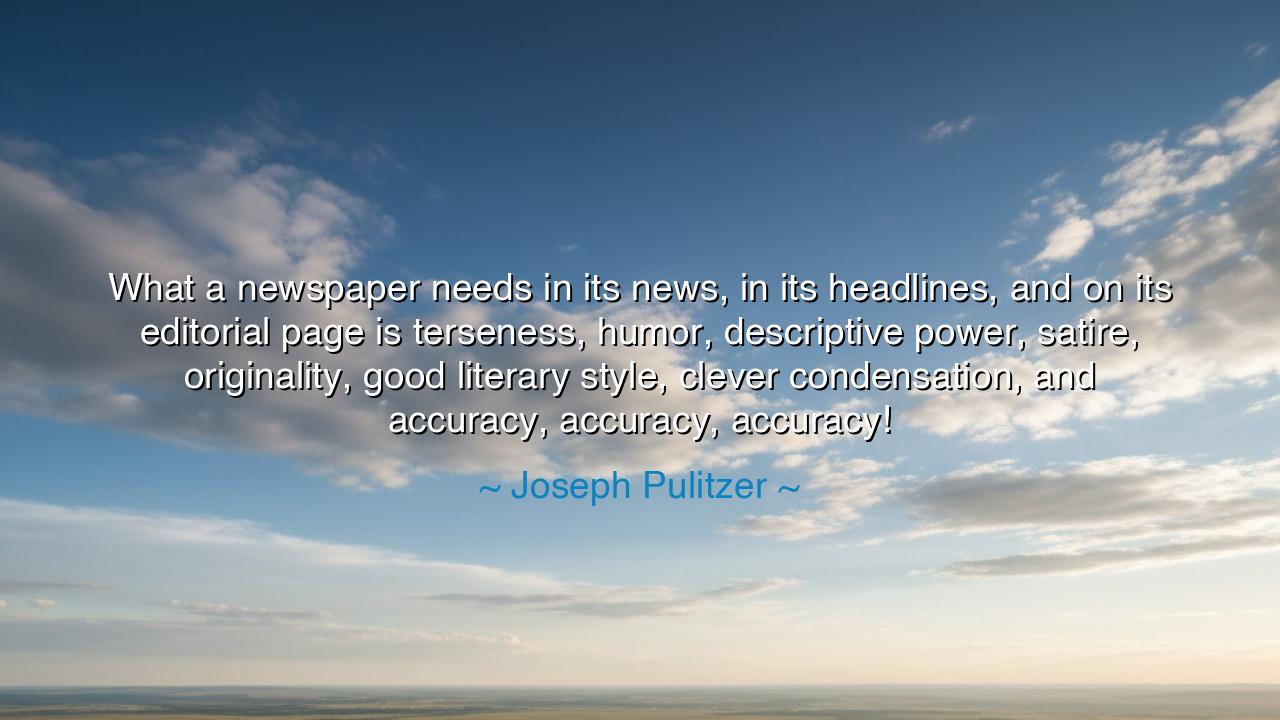
What a newspaper needs in its news, in its headlines, and on its
What a newspaper needs in its news, in its headlines, and on its editorial page is terseness, humor, descriptive power, satire, originality, good literary style, clever condensation, and accuracy, accuracy, accuracy!






When Joseph Pulitzer declared, “What a newspaper needs in its news, in its headlines, and on its editorial page is terseness, humor, descriptive power, satire, originality, good literary style, clever condensation, and accuracy, accuracy, accuracy!”, he was not merely describing the craft of journalism — he was defining the moral compass of truth itself. These words, spoken by one of the titans of modern media, carry the fire of conviction and the discipline of purpose. In his view, a newspaper was not a mere instrument of commerce, but a living guardian of democracy — a mirror of the people’s voice, sharpened by wit, tempered by truth, and guided always by accuracy.
In the manner of the ancients, this teaching might be called the Doctrine of the Written Flame — the belief that words, once set upon the page, can either enlighten or destroy. Pulitzer, whose own life was carved from struggle — a poor immigrant rising to become the most influential newspaperman of his age — knew the peril of misinformation and the power of integrity. His command, “accuracy, accuracy, accuracy,” was not repetition for style, but for sanctity. It was a chant, a vow, a warning. For in the realm of words, truth is the only currency that does not decay. A journalist who betrays it, betrays the very soul of his craft.
Yet Pulitzer also demanded humor, originality, and literary style — the balance between fact and feeling. He understood that truth must not only be told, but felt. To hold a reader’s attention is to hold their heart, and thus the writer must use all the tools of art — the rhythm of sentences, the sharpness of satire, the color of description — to awaken the public mind. As the ancients painted their temples with both law and beauty, so too must the modern scribe write with both logic and soul. Terseness ensures clarity, humor ensures humanity, and style ensures that truth is not only seen but remembered.
Consider the example of Pulitzer’s rival, William Randolph Hearst, whose sensationalism birthed the phrase “yellow journalism.” Hearst sought not truth but influence, not enlightenment but spectacle. His headlines burned bright but empty, like torches made of straw. Pulitzer, though he too wielded the fire of competition, learned to master it rather than be consumed by it. In his later years, he transformed his papers into instruments of reform — exposing corruption, uplifting the poor, and demanding honesty in government. His words were weapons, but weapons wielded for justice, sharpened always by accuracy.
Descriptive power and clever condensation, too, were essential in Pulitzer’s creed. In an age before the flickering screens of modern distraction, he already foresaw the tyranny of the short attention span. He taught that words must strike quickly, like an arrow loosed from a steady hand — brief, but piercing. To condense without losing meaning, to describe without drowning in detail — this is the alchemy of great writing. It is the difference between noise and narrative, between a crowd’s shout and a clarion call that awakens nations.
Yet above all, Pulitzer’s message endures because it transcends journalism. It speaks to every craft, every calling that wields words or influence. Whether one is a writer, a teacher, a leader, or a citizen — one must learn to speak with truth, to act with clarity, and to live with accuracy. For a world built on falsehood collapses under its own weight, but one built on truth stands eternal. The pen, said the sages, is mightier than the sword; yet Pulitzer reminds us that it is also heavier — for it bears the weight of conscience.
The lesson, then, is timeless: let your words be as sharp as your morals. Seek terseness to avoid confusion, humor to remind others of their humanity, originality to bring new light into dark places, and above all, accuracy — for without it, all other virtues fall. Whether you write for millions or speak to one, remember that every word you send into the world is a seed. If it is true, it will bloom; if it is false, it will poison. As Joseph Pulitzer taught, to write — and to live — is to serve truth faithfully. And in that service, one finds not only greatness, but immortality.






AAdministratorAdministrator
Welcome, honored guests. Please leave a comment, we will respond soon